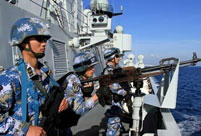 10 low-carbon tips to save money
10 low-carbon tips to save money
 Luxury cars make Asia premiere at Auto China
Luxury cars make Asia premiere at Auto China
 Versatile dog
Versatile dog
 Ni Ni covers BAZAAR JEWELRY
Ni Ni covers BAZAAR JEWELRY
 Cherry blossoms reach peak bloom in Washington D.C.
Cherry blossoms reach peak bloom in Washington D.C.
 Top Chinese fashion icons in foreigners' eyes
Top Chinese fashion icons in foreigners' eyes
 Asia's largest business aviation exhibition to be held in Shanghai
Asia's largest business aviation exhibition to be held in Shanghai
 World's top-rated luxury hotels
World's top-rated luxury hotels
 Wu Jing, Xie Nan to hold wedding on May
Wu Jing, Xie Nan to hold wedding on May
 London Cake International attracts tourists
London Cake International attracts tourists
U.S. President Barack Obama will visit Japan, South Korea, Malaysia, and the Philippines this week. America's Asia-Pacific "rebalancing strategy" is at a crossroads.
Since Obama announced that the U.S. would "return to Asia" three years ago, the country has spared itself no effort on the subject. However, its Asian allies have begun to experience their own doubts and fears. Firstly, they're afraid that the U.S. will shift its focus to the conflict in Ukraine, the Syrian crisis, the Middle East peace agreement, and the Iran nuclear talks, and turn its strategic eye back to Europe and the Middle East. Secondly, they're afraid that if they provoke conflict with China, the U.S. may abandon its support and choose to protect its own wider interests. Thirdly, some allies, like Japan, are afraid that with China's rising influence they may be marginalized.
On the surface, what has caused the above concerns is Obama's failure to honor his government's commitments, and his absence from the East Asia Summit and the APEC summit due to the government shutdown last year. In addition, the weakness and inclination to compromise shown by the U.S. in its response to Russia during the Ukraine crisis has left its allies worried about its commitment to their protection, and its ability to deliver.
However, there is a deeper element to the issue - that America's Asia-Pacific "rebalancing strategy" is a product of the Cold War mentality. It will not bring peace or prosperity to the Asia-Pacific region, but will lead only to regional instability and unrest.
Firstly, the starting point of the strategy is to use allies to restrict or delay China's development, so that the power balance in the Asia-Pacific region will be conducive to U.S. interests and enable it to maintain its status as "boss".
Secondly, it is a strategy of betting on both sides. On the one hand it aims to contain China, on the other hand it hopes to take advantage of development opportunities brought by China's economic growth. The U.S. policy towards China leaves its allies uneasy, always worried about "betrayal". This concern is elemental, and cannot be resolved by a visit from Obama, or by some speech he makes.
Finally, the U.S. needs its allies to balance China; conversely, its allies also need China to balance the U.S. Therefore, a strange phenomenon has arisen in the Asia-Pacific region, where security relies on the U.S. while the economy relies on China, reflecting the region's complexity. In the long run, the current situation is conducive neither to the U.S., nor to regional peace and prosperity.
The fact of the matter is that America's Asia-Pacific "rebalancing strategy" represents the application of a 19th century method to solve the 21st century's problems, and it is doomed to failure. The U.S. needs to ask itself whether it plans to continue its stategy of containment and betting on both sides, or participate constructively in and benefit from the economic development in Asia-Pacific region.
The article is edited and translated from 《美亚太盟友为何忐忑》, source: Jiefang Daily, author: Wu Zhenglong.
 Beckham launches fund to support youth soccer in China
Beckham launches fund to support youth soccer in China Cherry blossoms hit peak bloom in Washington D.C.
Cherry blossoms hit peak bloom in Washington D.C. Children in ancient costumes learn Zhusuan
Children in ancient costumes learn Zhusuan Tens of thousands celebrate Water Splashing Festival
Tens of thousands celebrate Water Splashing Festival A bite of China II whets the appetite
A bite of China II whets the appetite Chinese frigate completes its 14th escort mission
Chinese frigate completes its 14th escort mission Let's dance in wealthy Shaanxi
Let's dance in wealthy Shaanxi A date with 798: feel the art around you
A date with 798: feel the art around you 3D-printed houses built in Shanghai
3D-printed houses built in Shanghai The backstage of the Fashion Week
The backstage of the Fashion Week College students in Han costumes
College students in Han costumes Postgraduate works as waitress
Postgraduate works as waitress Life in a Lahu village in Yunnan
Life in a Lahu village in Yunnan An orphan’s wedding
An orphan’s wedding Hollywood documentary brings Diaoyu Islands truth to new audience
Hollywood documentary brings Diaoyu Islands truth to new audienceDay|Week|Month